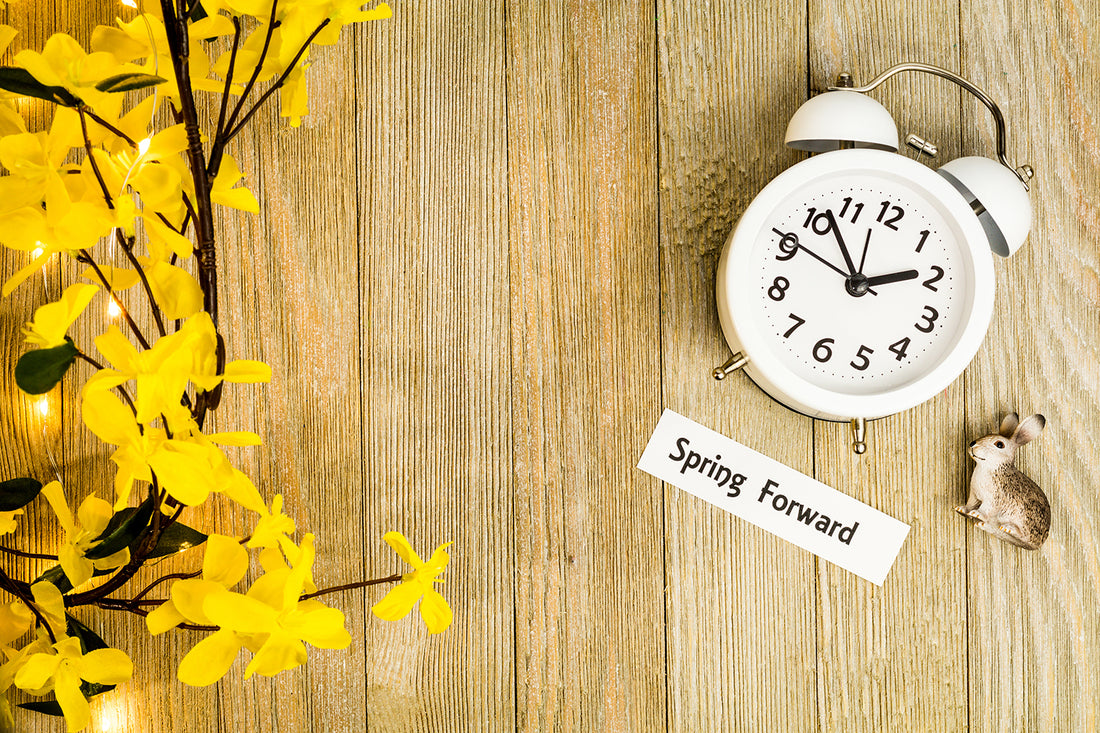As we spring forward into daylight saving time (for those of us who changed our clocks), we eagerly anticipAs we spring forward into daylight saving time (for those of us who changed our clocks), we eagerly anticipate extended daylight and sunnier days. Yet, this annual time shift can throw our hormonal harmony off balance, affecting our mood, energy levels, and overall wellness. By unraveling these shifts and embracing tactics to counter them, we can glide effortlessly into the new season.
Hormonal Impact
Cortisol Rollercoaster: The abrupt time change disrupts our circadian rhythms, causing cortisol levels to go haywire. Cortisol, the notorious "stress hormone," typically peaks in the morning and mellows out by evening. Daylight saving time can jolt this rhythm, potentially triggering heightened stress and anxiety.
Melatonin Mix-Up: Our bodies release melatonin, the sleep-inducing hormone, in response to darkness. With longer daylight hours, melatonin production delays, making it tougher to doze off and leading to sleep disruptions.
Serotonin Swings: Serotonin, the mood-boosting hormone, dances with sunlight. While extra daylight can lift serotonin levels and spirits, the initial adjustment phase may trigger temporary mood swings, impacting emotional well-being.
Tips to Tackle Hormonal Havoc
Slow Shift: Kick off the sleep schedule adjustment a few days pre-time change. Shift bedtime and wake-up time 15-20 minutes earlier daily for a smoother transition.
Morning Sunshine: Bask in the morning sunlight to reset your internal clock and nurture balanced cortisol and serotonin levels.
Nighttime Calm: Craft a soothing bedtime ritual to signal your body it's relaxation o'clock. Ditch screens and bright lights an hour before bed to boost melatonin release.
Nutrient-Rich Diet: Opt for a well-rounded diet packed with hormone-friendly nutrients. Omega-3 fatty acids, magnesium, and vitamin B6-rich foods work wonders.
Stay Active: Regular exercise is a hormone regulator, mood enhancer, and sleep promoter. Aim for 30 minutes of activity most days preferably in the morning.
Stress Soother: Integrate stress-busting rituals like meditation, yoga, or deep breathing into your daily grind for cortisol balance.
Expert Assistance: If sleep woes or mood shifts persist, seek counsel from a healthcare professional for tailored guidance.
These tips aim to smoothen the transition into the time change and minimize the health and hormonal toll of daylight saving time. Though daylight saving time can throw our hormones for a loop, taking proactive steps and embracing these strategies can help cushion its impact. By grasping the changes and supporting our bodies, we can welcome the longer days and savor a harmonious leap into spring.
Works Cited
Friedel, Keith, 6 Tips to Help You Spring Forward, Healthpartners.com, https://www.healthpartners.com/blog/6-tips-to-help-you-spring-forward/
Hadlow NC, Brown S, Wardrop R, Henley D. The effects of season, daylight saving and time of sunrise on serum cortisol in a large population. Chronobiol Int. 2014 Mar;31(2):243-51. doi: 10.3109/07420528.2013.844162. Epub 2013 Oct 24. PMID: 24156521. https://pubmed.ncbi.nlm.nih.gov/24156521/
Manfredini R, Fabbian F, Cappadona R, Modesti PA. Daylight saving time, circadian rhythms, and cardiovascular health. Intern Emerg Med. 2018 Aug;13(5):641-646. doi: 10.1007/s11739-018-1900-4. Epub 2018 Jul 3. PMID: 29971599; PMCID: PMC6469828. https://pubmed.ncbi.nlm.nih.gov/29971599/
Mills J, Kuohung W. Impact of circadian rhythms on female reproduction and infertility treatment success. Curr Opin Endocrinol Diabetes Obes. 2019 Dec;26(6):317-321. doi: 10.1097/MED.0000000000000511. PMID: 31644470. https://pubmed.ncbi.nlm.nih.gov/31644470/
Soares, Emily, Daylight Savings: Health Effects and Tips, WebMD.com, https://www.webmd.com/sleep-disorders/spring-forward-with-sleep-tips
Stražišar BG, Stražišar L. Daylight Saving Time: Pros and Cons. Sleep Med Clin. 2021 Sep;16(3):523-531. doi: 10.1016/j.jsmc.2021.05.007. Epub 2021 Jul 2. PMID: 34325828. https://pubmed.ncbi.nlm.nih.gov/34325828/
Zerbini G, Merrow M, Winnebeck EC. Weekly and seasonal variation in the circadian melatonin rhythm in humans: A response. J Pineal Res. 2022 Jan;72(1):e12777. doi: 10.1111/jpi.12777. Epub 2021 Nov 8. PMID: 34689364. https://pubmed.ncbi.nlm.nih.gov/34689364/

